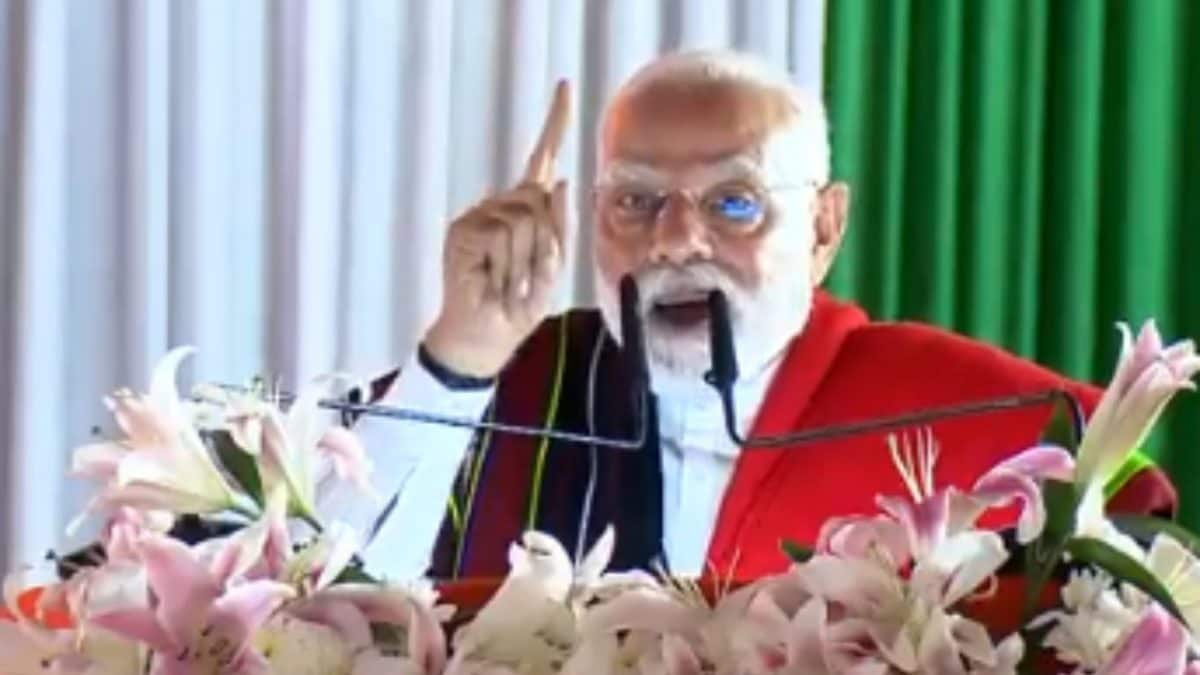Last Updated:
The PM visited Churachandpur and Imphal, met displaced people, launched many infra projects, laid foundation stones for others, and repeatedly called for peace and reconciliation

The PM called on all organisations to adopt ‘the path of peace’, appealing for dialogue between hills and valleys. Image: X
Prime Minister Narendra Modi on Saturday made his first visit to Manipur since ethnic violence erupted there in May 2023, a long‑awaited return that carried both symbolic weight and concrete promises of development. Over two years after clashes between the Meitei majority in the valley and the Kuki‑Zo tribal groups in the hills, PM Modi visited Churachandpur and Imphal, met with displaced people, inaugurated multiple infrastructure projects, laid foundation stones for others, and repeatedly called for peace and reconciliation.
Recommended Stories
The violence that began in May 2023 was triggered by tensions around a court order examining the grant of Scheduled Tribe status to Meiteis, which tribal groups opposed. More than 260 people have died, and over 60,000 have been displaced since then. The state government under chief minister N Biren Singh resigned in February 2025 amid accusations of bias and dissent within his own party, and Manipur has since been under direct central rule. PM Modi’s visit was widely seen as both a response to growing criticism of central and state neglect and an effort to restore faith and normalcy among all communities.
Saturday began with the Prime Minister arriving in Imphal, though heavy rains forced a change in plans: his helicopter could not land in Churachandpur, requiring him to go by road instead.
His schedule included stops in Churachandpur, a majority Kuki‑Zo hill district, where he met displaced families in relief camps, and later engagements in Imphal, representing the Meitei‑dominated valley. At both places, the PM was greeted with traditional local hospitality, including shawls and gifts, and with large public gatherings.
One of the central features of the trip was the announcement of large‑scale infrastructure and welfare projects. The Prime Minister laid foundation stones in Churachandpur for works worth approximately Rs 7,300 crore, including the Manipur Urban Roads, Drainage, and Asset Management Improvement Project (around Rs 3,600 crore), five national highway projects worth over Rs 2,500 crore, the MIND (Manipur Infotech Development) project, working women’s hostels at nine locations, and upgrades to over a hundred schools across multiple districts.
In Imphal, he inaugurated 17 projects worth about Rs 1,200 crore, among them the civil secretariat at Mantripukhri, a new police headquarters, the IT SEZ building, upgraded Ima markets in four districts, and Manipur Bhawans in New Delhi and Kolkata.
He also committed to the construction of about 7,000 homes for families displaced by the conflict.
Beyond development, PM Modi’s speeches during the visit emphasised peace and unity. Addressing people in Churachandpur, he described Manipur as a land of “hope and aspiration” but acknowledged the shadow cast by violence. He called on all organisations to adopt “the path of peace”, appealing for dialogue between hills and valleys. At Kangla Fort in Imphal, he underscored that development depends on peace and urged that the future of the state’s children rests on mutual harmony.
The visit also carried political undertones, with the Centre under pressure to show it was neither blind to the suffering of displaced people nor favouring any particular group. Opposition parties criticised the visit as long overdue and called for more than symbolic gestures, demanding clarity on justice, rehabilitation, and accountability.
Security was tightened—with deployment of both central and state forces—and logistical preparations preceding the visit included large‑scale public engagement and visible arrangements in public places, as well as managing disruptions due to weather.
Overall, PM Modi’s visit on September 13 aimed to do more than inaugurate roads, hostels, or markets. It sought to restore trust, provide tangible relief to the displaced, and project a message that development without peace is incomplete.
About the Author
The News Desk is a team of passionate editors and writers who break and analyse the most important events unfolding in India and abroad. From live updates to exclusive reports to in-depth explainers, the Desk d…Read More
The News Desk is a team of passionate editors and writers who break and analyse the most important events unfolding in India and abroad. From live updates to exclusive reports to in-depth explainers, the Desk d… Read More
September 13, 2025, 21:43 IST
Loading comments…
Read More



